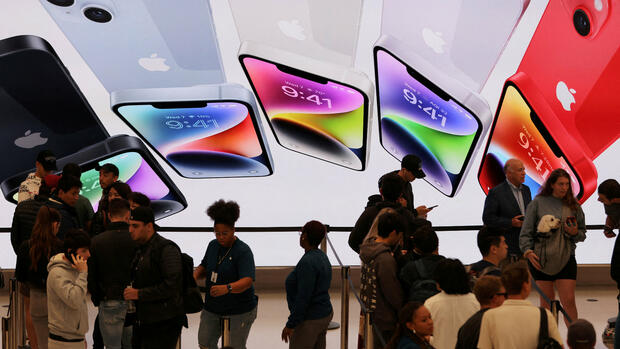Munich, Stuttgart Just not a word about Apple: The iPhone manufacturer has strictly forbidden its suppliers to report on their relationship with the US technology group. Now, however, the company itself has released information about its European contractors – for the first time in years.
“Our purchasing volume in Europe has increased by half in the past five years: last year it was 20 billion euros,” said Europe boss Cathy Kearney in a video conference with media representatives. Apple counts more than 4,000 European companies among its suppliers, including 800 from Germany. Kearney: “Never has Europe made a more important contribution to our products than now.”
Kearney named major chip manufacturers such as Infineon from Munich, the French-Italian STMicroelectronics and AMS Osram from Austria. Rather surprisingly, the manager also explained what an important role the traditional Swabian company Trumpf plays for Apple. The high-tech components of the 100-year-old family company from Ditzingen near Stuttgart are used for a whole range of Apple products.
Among them is a small laser that enables a proximity sensor for the iPhone. This turns off the display when an object is detected nearby. This saves electricity and prevents accidental selection of functions by touch — for example, when users hold the phone to their ear.
The fact that Apple names Trump as a supplier is a kind of accolade for the Swabians. Because the company only entered the laser diode business five years ago. Trumpf took over a former spin-off from the University of Ulm from Philips for more than 100 million euros.
>> Read also: Highly sensitive sensors and ultra-fast chips: Trumpf subsidiary is driving quantum research forward
It is a completely new product field beyond the traditional business with laser machines for sheet metal processing. “Through this acquisition, we want to open up new product fields and expand our existing portfolio at a strategically important point,” said Trumpf boss Nicole Leibinger-Kammüller at the time.
Foreign companies manufacture for Apple in Germany
Trumpf’s smallest lasers for Apple come from the Ulm production facility of the Photonic Components subsidiary. The division has sold two billion of the pinhead-sized laser diodes in the past eight years. That means: Apple has accepted about half of the entire production.
Nevertheless, the Swabians are not yet one of the really big suppliers of the US group. According to the company, the hundred most important suppliers account for 98 percent of the total purchasing volume. From Germany, these include Bosch, Henkel, Infineon and the battery specialist Varta.
The division has sold two billion of the pinhead-sized laser diodes in the past eight years.
(Photo: TRUMPF)
In addition, individual components of the Apple devices that foreign companies manufacture here come from Germany. These include components from the Texas Instruments factory in Freising or from the Qualcomm factory in Munich.
According to Apple itself, it employs 25,000 people in Europe, which is 5,000 more than three years ago. In Germany there are 4,500. The group is currently investing in Munich in particular.
In March, the company announced that it would significantly expand its European center for chip design in the Bavarian capital. One billion euros will be invested in the site over the next six years. “Our engineering teams in Munich are among the world’s most innovative and help to develop new technologies,” said Apple boss Tim Cook at the time.
The largest research location in Europe is Munich
The new investment expands the billion-euro investment in Munich announced in 2021. It is already Apple’s largest research site in Europe with around 2,500 engineers.
With the prestigious customer Apple behind him, Trumpf now wants to further expand the business in Ulm and invest a two-digit million sum. Among other things, the clean room production is to be expanded for around ten million euros. Since entering the segment in 2019, the company has invested more than 40 million euros in Ulm and commissioned around 20 new production facilities.
Apple is clearly interested in a long-term supply relationship. “We have been working with some of our suppliers in Europe for more than 30 years,” said Europe boss Kearney.
At the same time, the group is repeatedly criticized in Europe for its business practices. France’s judiciary has launched investigations into allegations of planned wear and tear against Apple. As the Paris public prosecutor’s office of the German Press Agency confirmed on Monday, it is also about possible fraudulent business practices.
The investigations were initiated in December and handed over to the competition authority. An organization dedicated to fighting intentional product wear and tear (so-called planned obsolescence) had previously filed a lawsuit.
In the case of planned obsolescence, the manufacturer wants a product to become obsolete or no longer work in order to sell new devices. It is also not in the interest of European suppliers to be associated with such business practices.
More: Apple’s results convince investors: iPhone sales are increasing surprisingly strongly
